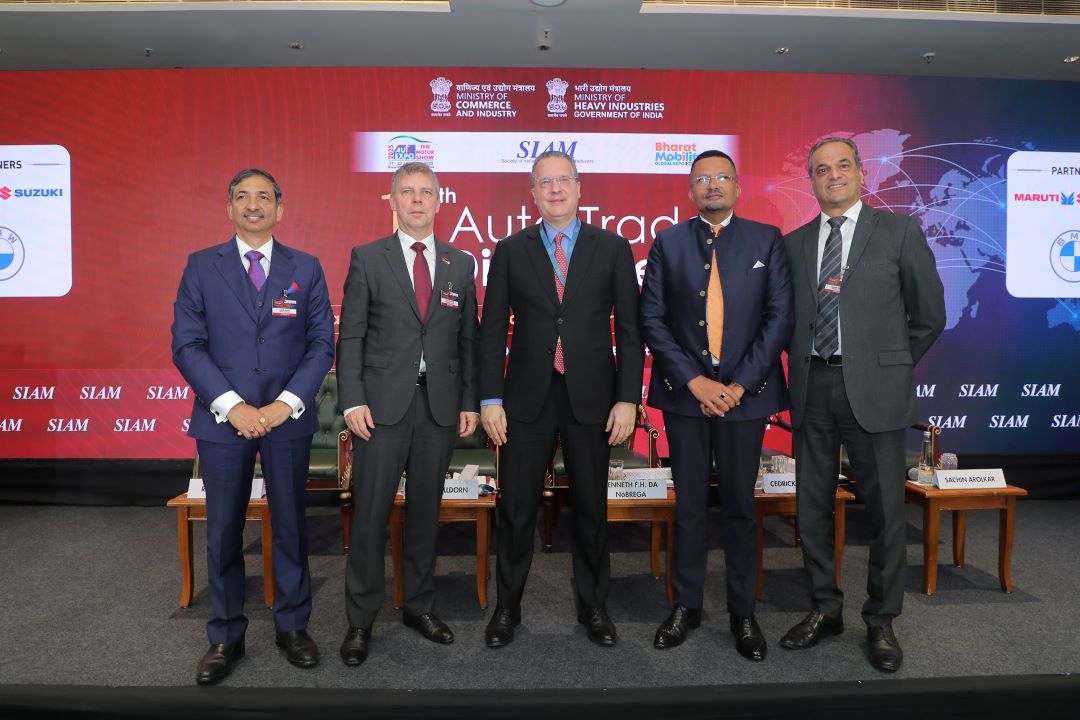The Society of Indian Automobile Manufacturers (SIAM) hosted the 11th Auto Trade Dialogue alongside the Bharat Mobility Global Expo 2025 at Bharat Mandapam, New Delhi. The event, themed “Changing Paradigm of Global Trade Practices in the Auto Sector,” brought together government officials, industry leaders, and experts to explore the evolving automotive trade landscape, challenges, and growth opportunities.
The session kicked off with addresses from key dignitaries, including H.E. Kenneth F. H. da Nóbrega, Ambassador of Brazil to India, Cedrick Crowley, Deputy High Commissioner of South Africa, Dr. Sven Halldorn, Director General of Germany’s Federal Ministry of Digital & Transport, Rahul Bharti, Chairman of SIAM’s International Relations & Trade Policy Group, and Sachin Arolkar, Co-Chair of SIAM’s International Relations & Trade Policy Group.
The opening remarks highlighted the significance of the ongoing clean energy transition within the global auto industry. Rahul Bharti, Executive Director at Maruti Suzuki India, emphasized the importance of addressing energy, economic, and environmental factors to navigate industry changes and find shared solutions.
H.E. Kenneth F. H. da Nóbrega underscored Brazil’s tax reforms that have enhanced value chains and discussed opportunities for collaboration between Brazil and India in the auto sector. “This is a prime moment to deepen investments and leverage mutual expertise for a sustainable transition,” he said.
The first session, “Integrating Investments in Trade Agreements,” featured expert insights from Mike Hawes, Chief Executive of the UK’s SMMT, and other notable speakers, discussing the importance of aligning trade and technology for mutual growth. Mr. Hawes noted that the UK had experienced a 50% increase in EV sales in 2024, illustrating the potential of well-integrated trade policies.
The second session, moderated by Yash Pal Sachar, focused on the strategic implications of localization policies. Experts such as Charaka Perera from the Ceylon Motor Traders Association and Karan Chaudhary from Nepal’s NADA Automobile Association highlighted the importance of localization for competitiveness and sustainability in the global auto trade.
Santosh Kumar Sarangi, Director General of the Directorate General of Foreign Trade, emphasized India’s commitment to ensuring the efficient implementation of industry schemes and improving manufacturing capabilities.
The third session, “Developing Resilience in the Evolving Global Trade Scenario,” moderated by Sumanta Chaudhari, explored the challenges and opportunities presented by shifting global trade dynamics. Speakers, including Shinichiro Oka from the Japan Automobile Manufacturers Association, discussed the role of tariff reductions and the need for a collaborative approach to address CO2 emissions.
The event concluded with closing remarks from Asif Shamim, Co-Chair of SIAM’s Exports Group, who emphasized the importance of collaboration in driving sustainable growth within the automotive sector. Delegates from around the world underscored the need for policy alignment, innovation, and resilience in adapting to the changing global trade landscape.
SIAM represents India’s major vehicle and engine manufacturers, promoting sustainable mobility and environmental initiatives. Committed to national growth, the organization plays a pivotal role in fostering the automobile industry’s contribution to India’s economic development and transition to cleaner technologies.








